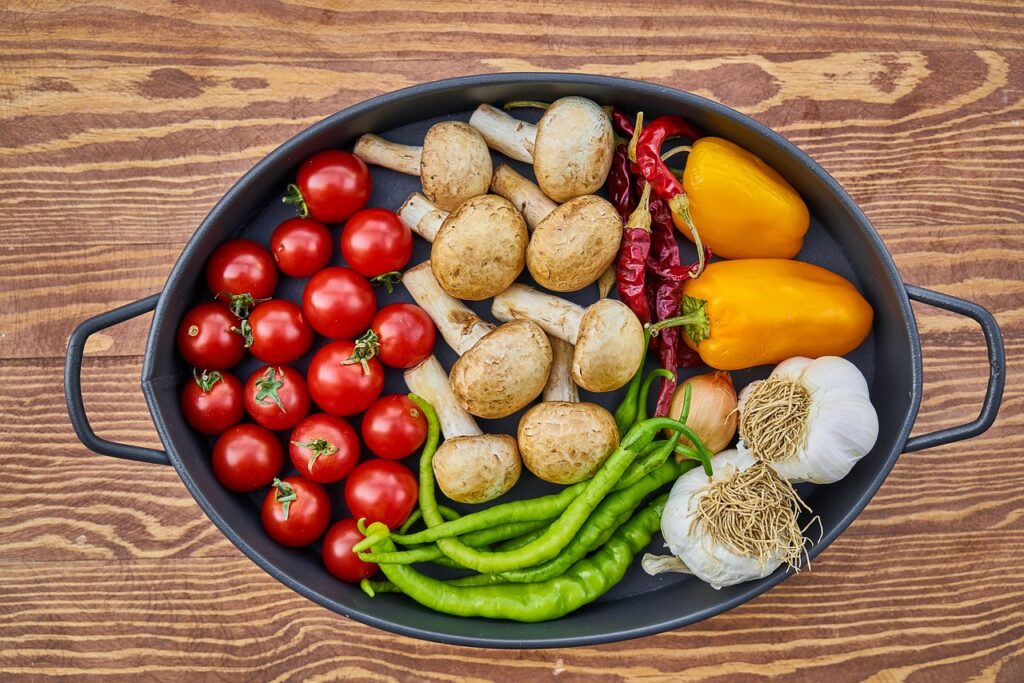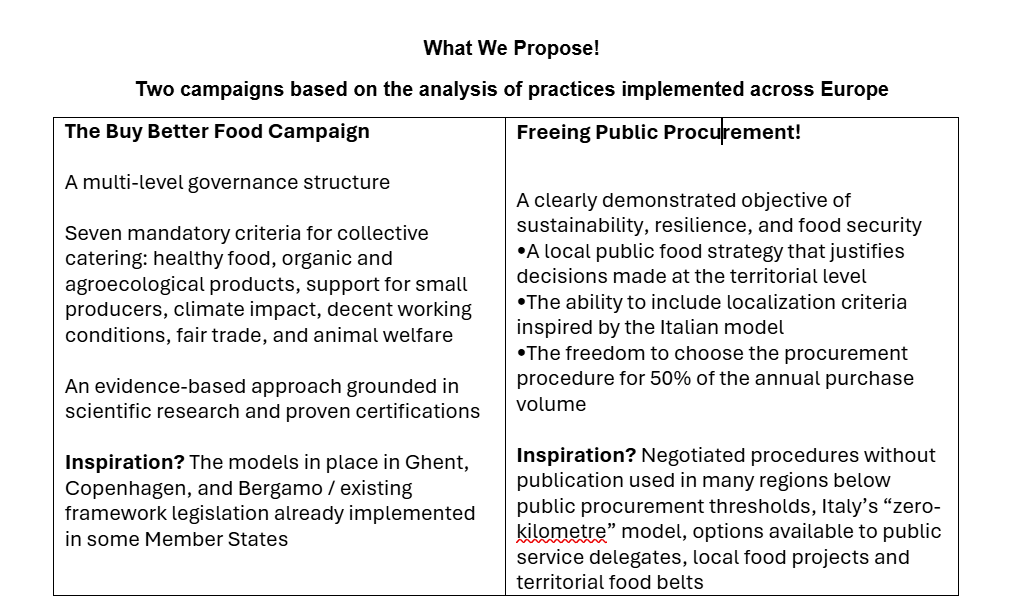A powerful narrative is spreading all around Europe supported by the Brussels Declaration
« In recent years, local authorities and among them organic cities and regions across Europe demonstrate that public canteens are a lever for combating food insecurity, reducing social inequalities, boosting local economies, supporting sustainable agriculture, increasing the proportion of organic products, protecting the environment, and promoting healthier diets.»

These were the opening words of the Brussels declaration of November 2024, in which ICLEI, IFOAM, Organic Cities, the Buy Better Food campaign, Biodinamica and the partners in the Freeing public food procurement campaign – France Urbaine, Eating City, Agores, Manger Demain, the Lascaux centre for transitions, the cities of Brussels and Mouans Sartoux – called on the European Union to consider two issues:
- Establishing minimum sustainability criteria within a harmonized European framework that empowers local authorities to make more sustainable choices ;
- Simplifying public procurement and offering the flexibility to select the most effective procedures to strengthen local short supply chains, contributing to fair, healthy, and sustainable food system.
Remarkable Commitment from Local Stakeholders Despite Persistent Constraints
A Committed Approach in the Liège Region
Davide Arcadipane reflects on the strategy pursued over several years to promote sustainable and local sourcing. Producing 4,000 meals per day—including 3,000 for schools—public collective catering helps structure market outlets for around fifty farms at the provincial level and about one hundred at the Walloon regional level. The resulting economic flows thus return to the territory, with a genuine multiplier effect. The implementation of a local processing tool also supports nearby sourcing. The preferred lever remains the negotiated procedure without publication, best suited to the needs and profiles of producers. The aim is to implement procedures where producers are not forced to compete with multinationals or wholesalers.
However, this approach is constrained by the inevitable limits imposed by public procurement thresholds and purchase volumes. For example, this prevents the inclusion of meals served in nursing homes or hospitals. The difficulty of introducing geographic origin criteria is also highlighted. Such introductions remain delicate and lead to real paradoxes: Wallonia’s support for the approach is conditioned on backing local production, yet the legal framework does not facilitate meeting this objective. At the national level, unlike in some other EU member states, the concept of “short supply chains” is not defined. Moreover, as in many European countries, in a complex public finance context, local authorities face the dilemma of aiming for high-quality food and valuing professions and products while dealing with budget cuts.
Quality Sourcing and Food Security : A Dual Priority in Baltic Region
Jennifer Avci, founder of Sustainable Gastro, notes that between 2022 and 2024, 42 schools in Võru County (Estonia) have undertaken efforts to increase the volume of local organic products through short supply chains. In close collaboration with local producers, a logistics center is being developed to store and package food. In Latvia, the Ministry of Agriculture has launched a “Farm to School” task force to establish four such centers.
Persistent Paradoxes in France and Europe
Gilles Pérole, elected official responsible for food policy at the Association of Mayors of France and deputy mayor of Mouans-Sartoux, points out that many cities—from major ones like Paris, Toulouse, Milan, Copenhagen, and Liège, to smaller towns—are engaged in these efforts. In Mouans-Sartoux, several impact studies show that high-quality collective catering changes residents’ habits. According to Gilles Pérole, despite possible ways to turn to local producers by combining different criteria, « the reality is that farmers don’t have time to respond to public tenders, so we need much more simplified processes for direct sourcing. »
He also highlights an inequality between public and private sectors: in the EU system, which supposedly promotes free competition, a municipality can require local sourcing when delegating to a private operator but is restricted when managing the service directly. Moreover, not all EU countries interpret EU rules the same way: Italy’s zero-kilometer legislation and Romanian regulations make it easier to introduce local criteria. This calls for renewed state involvement to support sustainable, local procurement and a more harmonized European framework.
An Evolving European Framework Refocusing on Competitiveness and Defense
Although the vision for agriculture and food published in February by Commissioner Hansen mentions public procurement, it remains focused on production and neglects the broader food system, only partially reflecting the work initiated through the strategic dialogue on the future of agriculture. Focusing solely on farmers, warns Marta Messa, Secretary General of Slow Food, is to miss out on a comprehensive food systems vision. Slow Food, active in over 160 countries promoting sustainable, quality food, defends this systemic view within the EBAF (European Board on Agriculture and Food), a panel of experts advising the European Commission.
A new Multiannual Financial Framework (MFF) expected in the autumn will be key for identifying EU priorities—security and defense concerns, as well as competitiveness, are likely to dominate.
Work is underway on simplifying the Common Agricultural Policy (CAP). Slow Food warns that so-called simplification risks becoming a pretext for weakening social and environmental ambitions.
The Water Resilience Strategy is under development in response to droughts and floods affecting many member states. Slow Food cautions against a purely technical approach that ignores broader issues like the impact of food waste on water consumption.
Seed law reform is currently under trilogue negotiations. Concerns have been raised about Article 30, which could limit action for small producers and directly harm species biodiversity—a sector that has already suffered immense losses in the last 60 years due to reliance on treated seed varieties.
An evaluation of EU public procurement directives is also underway, with a revision process planned starting in 2026. France urbaine is a stakeholder in this process alongside the European Commission. Wim Debeuckelaere notes that although the sustainable food system law is no longer on the agenda, the Commission is finalizing a list of environmental, nutritional, and socio-economic criteria to be released for public consultation. These criteria, inspired by the Buy Better Food Campaign (mentioned by Jean-Marc Louvin of ICLEI), will guide local authorities.
To support implementation and knowledge sharing, a European buyers’ network and an information exchange platform are being developed. Copenhagen is notably at the forefront of this initiative.
What Are the Levers for Mobilization?
Food Security, Financial Constraints, and Competitiveness — a conceptual battle at the heart of the European agenda. The key is to defend competitiveness through quality. Marta Messa warns against a narrow interpretation of competitiveness focused on technical progress, cost reduction, and quantity, to the exclusion of sustainability. In a context where one-third of food produced is wasted, she advocates for positive, healthy competition that values cultural, food, and knowledge diversity.
This approach aligns with the work of Maurizio Mariani of Eating City, who frequently highlights how massive flows in collective catering revenues have shifted toward intermediaries, to the detriment of producers—whose numbers are dangerously declining.
Similarly, Stéphane Linou, who champions the concept of food resilience in France, emphasizes that short, local supply chains are a strategic bet in the face of long supply chains’ vulnerability to geopolitical and climate shocks. Sustainable, local production is a strategic security issue.
A Reversal of the Public Finance Argument. Gilles Pérole finally invites us to reverse the argument regarding constraints on public finances by reminding us of the current cost of agricultural and food systems. Among the €48 billion in public support recently assessed in a report by Secours Catholique, the Civam network, Solidarité Paysans, and the French Diabetes Federation, nearly €19 billion are directed toward unsustainable systems that generate additional costs (health, pollution control, etc.). « The public sector pays twice, » laments the local elected official.
A Legal Battle – Demanding Coherence. For Fabrice Riem, a law professor at the University of Pau, it is not so much about adding a new text to the pile of regulations as it is about making the different legal frameworks related to food systems coherent. These are numerous, fragmented, and often contradictory. Maurizio Mariani highlights that the revised 2022 Italian Constitution states that private economic initiative is free but must not harm safety, freedom, human dignity, health, or the environment. The law establishes the necessary controls to enforce this framework. Such a legal foundation exists in every country and must support initiatives at the national, regional, and local levels. The right to food is also a topic of discussion within the Council of Europe.
A Collective Mobilization : Food as a Unifying Horizon. As Marta Messa reminds us, “Food quality is not just a luxury issue. We need engaged civil societies.” The School Food 4 Change project, led by Eating City, along with the efforts of ICLEI, Eurocities, and Slow Food, demonstrates that a deep movement is underway across Europe. In a growing number of countries (Czech Republic, Italy, France, Denmark, Belgium, Lithuania…), families, teachers, children, and municipalities are involved in a profound transformation. For Jennifer Avci, “Canteen meals are the only language everyone speaks.” Maurizio Mariani calls for bringing together all stakeholders and organizing major events in Brussels. This must start with local and regional actions and a strong dialogue with local politicians and European parliamentarians, who are currently not sufficiently mobilized.
A Priority for the European Parliament
Valérie Hayer (Renew) and Camilla Laureti (S&D), both Members of the European Parliament, emphasize the importance of the topic and collective mobilization. Valérie Hayer encourages a global approach to agricultural policies while maintaining a clear focus on the European Green Deal objectives. The target of 25% of land dedicated to organic farming cannot be achieved solely through public aid mechanisms; it also requires work on demand, consumption, and supply chains. Similarly, trade tensions, which reveal the strategic nature of our sovereignty, demand that we directly address food security and sustainability goals. The MEP expresses her commitment to supporting initiatives that improve farmer remuneration by better accounting for product quality and, more broadly, to strengthening farmers’ negotiating power in product sales. Renew has also advocated for greater use of public procurement.
Camilla Laureti calls for supporting the involvement of local and national authorities to ensure food security that protects the environment and public health while guaranteeing quality food. She highlights the importance of this issue in rural areas, particularly in the context of redefining cohesion policy. Her approach is holistic, considering the social, environmental, and health dimensions.
A Goal for the European Parliament: The Organic Cities Roadmap
Claudio Serafini reminds us that mobilizing the European Parliament is one of the objectives of the Organic Cities roadmap, which aims to organize a conference at the Parliament in the autumn. Alongside Maurizio Mariani, he calls for revisiting fundamental questions in a renewed way: “How do we feed humanity? The answer is local, because international institutions are weak, but we also need to strengthen international dialogue to feed humanity with social justice and respect for the planet.”
Such a conclusion echoes the determined opening remarks of Audrey Pulvar, Deputy Mayor of Paris and Co-Chair of France urbaine’s Food Strategies Commission: “Our advocacy reflects a shared conviction: the profound ecological transition of agriculture and our European agricultural and food systems is possible—and happening now. It is our responsibility to build the framework for more resilient and fairer systems that also enhance the appeal of economic sectors suffering from a lack of interest among those considering career changes or professional commitment.”
Références
L’injuste prix de notre alimentation | Secours Catholique – Caritas France
https://www.goodfoodforall.eu/
https://deklic.eco/stephane-linou-on-est-dans-une-illusion-de-securite-alimentaire/
Rappel des bonnes pratiques recensées par France urbaine en lien avec les travaux d’ICLEI
MANIFESTE POUR LIBÉRER LA COMMANDE PUBLIQUE : PRÈS DE 100 SIGNATAIRES – France urbaine
